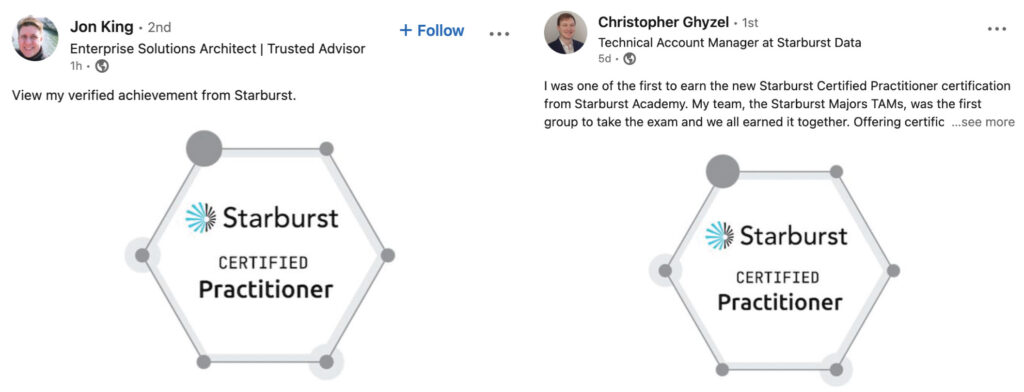In today’s data-driven world, where organizations rely on insights for decision-making, staying ahead of the curve is crucial. We’re thrilled to announce that Starburst, the trailblazing provider of the modern data lake analytics platform, has launched its data analytics certification program.
The Starburst Practitioner exam is designed to evaluate candidates’ foundational understanding of Starburst’s cutting-edge products, architecture, and features, as well as their proficiency within Starburst’s dynamic data ecosystem — including topics such as data lakes and data lakehouses, and modern table formats like Apache Iceberg.
The data ecosystem continues it’s rapid evolution, with growing volumes of data existing in multiple formats and residing in both cloud and on-premises environments. To unleash the full potential of this data, organizations require agile, scalable, and secure solutions to extract actionable insights efficiently.
Starburst has been at the forefront of this revolution, providing innovative technologies that empower businesses to harness the power of their data wherever it resides.
Data lake analytics certification with Starburst
Upon successfully completing a Starburst Certification, you’ll be able to showcase your in-demand skills with a digital credential and gain exclusive membership to our LinkedIn group! Also, join Starburst.io/community
There aren’t any prerequisites, and you won’t need a master’s degree in computer science. However, to prepare, the Starburst Certified Practitioner exam guide provides an overview of the concepts and knowledge areas covered and walks you through the exam structure and question formats.
Starburst Certified Practitioner exam guide
Start with self-paced, free courses online through Starburst Academy
Starburst Practitioner Exam
This forty (40) question exam tests and validates candidates’ knowledge of Starburst architecture and basic data lake analytics
Key focus areas of the data analytics Starburst Certification program
We are genuinely overwhelmed with the immense excitement that Starburst Data’s certification program has generated within the data community. This program will not only validate candidates’ knowledge of Starburst’s products and features but also recognize their broader understanding of the data ecosystem.
By earning this certification, data professionals will distinguish themselves as leaders in the field and forward-thinkers ready to tackle the evolving challenges of data management and analytics.
Below are a few key focus areas of the data analytics Starburst certification:
Starburst foundations
Candidates will display a foundational understanding of Starburst’s platforms, features, architecture, and how its SQL query engine processes queries. Topics around data federation, MPP, components of a Starburst cluster, data federation, and Starburst use cases are included in the exam.
Related course: Learn basic SQL using Starburst Galaxy
Related reading: Why SQL is the language everyone needs to know
Trino
Trino is the underlying technology upon which Starburst builds enterprise solutions. Candidates should have a high-level understanding of Trino, open-source software, and it’s functionality.
Related reading: What is Trino?
Courses on data lakes and data lakehouses
Data lakes have become a cornerstone of modern data management, allowing organizations to store vast amounts of structured and unstructured data. Successful candidates will display high-level insights about data lakes and data lakehouses in delivering real-time analytics capabilities. Additionally, the exam includes questions focused on modern table formats, such as Apache Iceberg and Delta Lake, which extend the abilities of legacy data lakes.
Related course: Exploring data lakes and data lakehouses
Data ecosystem course
Databases and data warehouses allow for efficient storage and retrieval of data, as well as fast analytical queries. Starburst expands the utility of these foundational data management components by allowing for the federation of data with more modern data solutions such as data lakes and data lakehouses. This exam will ensure you understand the roles of databases and data warehouses, which remain a massively important aspect of many organizations’ data strategy.
Related course: Exploring the big data ecosystem
Starburst Certified Practitioner exam guide
More information about the certification program, including registration details and resources for preparation can be found in Starburst Academy
Future state: Additional certification exams
Be on the lookout for additional certification exams to further expand our program. Our future certification exams will offer new opportunities for data professionals to validate their knowledge and demonstrate their proficiency in essential areas of data management and analytics. We aim to continually enhance our certification offerings to meet the evolving needs of the data community.
Starburst Academy
Whether you’re a beginner or an experienced data professional, our courses expand your knowledge of Starburst and its ecosystem
FAQS: Frequently asked questions about your data analytics certification
What is the difference between a data analyst and a data scientist?
Data Analyst and Data Scientist are both important roles within the field of data science, but they have distinct differences in their expertise and skillsets.
Here are the differences between a data analyst and a data scientist:
Expertise as a data analyst vs. a data scientist
Data analysts primarily focus on examining and interpreting data to uncover insights and trends that can inform business decisions. They often work with structured data and use various tools and techniques to clean, organize, and visualize data for reporting purposes. Their primary goal is to answer specific questions and solve immediate business problems.
Data scientists, on the other hand, are more focused on predictive and prescriptive analysis. They work with structured and unstructured data, and their tasks involve developing and applying complex algorithms, statistical models, and machine learning techniques to gain predictive insights and make data-driven recommendations. Data scientists are more involved in research-oriented projects and long-term data-driven strategies.
Skillsets as a data analyst vs. a data scientist
Data analysts are proficient in data manipulation, SQL, data visualization tools (like Tableau dashboards, and Power BI), and spreadsheet software (like Excel). They have a strong understanding of data cleaning, reporting, and basic statistical analysis.
Data scientists possess a more extensive skillset, including programming languages such as Python or R for data manipulation and analysis. They understand machine learning, deep learning, natural language processing (NLP), and other advanced statistical techniques. Data scientists also have expertise in data engineering and may work with big data technologies like Hadoop and Spark.
What is the difference between a data analytics certificate and a degree?
The difference between a data analytics certificate and a data analytics degree lies primarily in the level of education and the depth of knowledge they offer.
Here are the main differences between the two:
Level of education
A data analytics certificate is typically a short-term program that focuses on specific skills and practical knowledge related to data analysis. It is considered a post-secondary education, and the duration can range from a few weeks to several months.
Meanwhile, a data analytics degree is a formal academic program offered at the undergraduate or graduate level. It provides a more comprehensive and structured education in data analytics, often requiring two to four years for a bachelor’s degree and one to two years for a master’s degree.
Depth of knowledge
Data Analytics Certificate programs are often more specialized (such as the Starburst Data Practitioner Exam) and focused on practical skills needed for specific job roles or industries.
Data Analytics Degree programs offer a broader and deeper understanding of data analytics, covering a wide range of topics, including statistics, machine learning, data mining, database management, and more.
Can I get a job with just a data analytics certificate?
Getting a job with just a data analytics certificate is possible (data analysis is always important work). Still, it may also depend on various factors such as the job market, the demand for data science jobs, and, more importantly, your ability to solve business problems and help the business make vital data-driven business decisions. That’s where your skills and experience will come in handy.
Here are three important considerations:
Skills and experience: While professional certificates can demonstrate basic knowledge, practical skills, and experience are also essential. Having projects, internships, or relevant entry-level experience can significantly improve your chances. If there is a high demand for data analysts in your industry, employers might be more willing to consider candidates with a data analytics certificate as long as they have the necessary skills and data fundamentals.
Don’t forget to network: As you gain experience, you can progress to more advanced business analytics roles. Then, don’t forget to build a strong professional network in the data analytics field because it can open doors to potential job opportunities.
Continuous learners win: Data analytics is a rapidly evolving field, and employers often seek candidates who can stay up-to-date with the latest tools and techniques. Getting hands-on experience beyond the certificate program is crucial. Read case studies! They’re a great way to see what’s important to prospective data-driven employers and how a specific technology has helped them.
While a data analytics certificate can be a valuable asset and may open doors to certain job opportunities, it is not a guarantee of employment.
To enhance your chances, consider gaining practical experience, expanding your skillset with synthesizing large data sets, and actively immerse yourself in opportunities and technology in all the various fields available in the data analytics field — business intelligence, Microsoft power BI, Tableau, open-source software (i.e. Trino). Over time, you’ll become the data professional you’ve always imagined yourself to be.
Join us in unlocking new possibilities as Starburst Data redefines the industry’s standard for expertise in data management.
How long does it take to get a data analytics certification?
The amount of time required and how you prepare for the certification exam will depend on your experience and knowledge of Starburst and the data ecosystem. Starburst offers over twelve hours of preparatory content to help individuals of all backgrounds to prepare.
Please review the Preparation Guide to better understand what resources are available.
Starburst Certified Practitioner exam guide
More information about the certification program, including registration details and resources for preparation can be found in Starburst Academy
What qualifications and skills are needed for data analytics?
To become a data analyst, several qualifications and skills are typically required. While specific requirements may vary depending on the company and the role, here are the most common qualifications needed to pursue a career as a data analyst:
- Educational background: Sure, a bachelor’s or master’s degree in computer science, statistics, mathematics, economics, engineering, artificial intelligence, or machine learning is helpful.
However, even without those degrees going through the Starburst Data Practitioner Program can accelerate your knowledge in data & analytics. Starburst has built a self-service interface that has made it easier for non-technical users to work with data and gain insights.
- Proficiency in data tools: Familiarity with data analysis and data visualization tools are crucial. Commonly used tools include SQL for data querying, Microsoft Excel, Python, R, or other programming languages for data manipulation and analysis, and data visualization tools like Tableau or Power BI.
- Database knowledge: Understanding how databases work and the ability to work with structured and unstructured data is essential. Knowledge of database management systems (DBMS) like MySQL, PostgreSQL, or NoSQL databases is undoubtedly valuable.
- Analytical and problem-solving skills: Hands-on, practical problem-solving and critical thinking skills to tackle complex data challenges and provide meaningful insights and solutions are critical. It’s been far more difficult to dream about being data-driven than to shorten the path from data to value.
- Communication skills in your respective domain: Know how to communicate technical findings and insights to non-technical business stakeholders. After the data analysis, you must be skilled with presenting your findings through reports, presentations, or visualizations. Moreover, having knowledge in the specific industry and understanding the business context helps in generating more relevant and actionable data-driven insights.
What are the benefits of a data analytics certification program?
A data analytics certification program offers various benefits for individuals seeking to establish a career in data analytics or advance their existing skills. Some key advantages of enrolling in a data analytics certification program include:
- Enhanced skillset: Certification programs provide a structured curriculum that covers essential concepts and tools used in data analytics. Participants gain in-depth knowledge and practical skills in data manipulation, analysis, and visualization.
- Credibility and recognition: Earning a recognized certification demonstrates a certain level of expertise and commitment to data analytics. Remember, you get an official Linkedin recognition when you pass the exam!
- Career opportunities: For those already working in the data analytics field, the Starburst Data Practitioner certification can open up new opportunities for career advancement. Why centralize your data, when you can access data wherever it is located? It’s a game-changer for most data professionals.
- Industry relevance: Data analytics certification programs are designed to align with industry standards and best practices. Employers often prefer candidates with certifications as it indicates their skills are up-to-date and relevant.
- Networking opportunities: Certification programs often provide opportunities to connect with other professionals in the field, including instructors, fellow students, and industry experts. Networking can lead to job referrals and valuable contacts in the industry. Join Starburst.io/community
- Increased employability: With the growing demand for data analytics professionals, certified practitioners are more likely to attract the attention of competitive employers.
- Confidence boost: A data analytics certification gives data professionals a sense of accomplishment and confidence. Starburst data practitioner exam takers have told us, “When I pass the exam, I get a mini high!”
- Up-to-date knowledge: Data analytics certification programs are regularly updated to keep pace with the latest developments in the field. Join our email list to stay updated on the latest educational opportunities with Starburst.
- Diverse job opportunities: Data analytics skills are valuable across various industries and sectors. A certification means you’ll have job opportunities in data-driven industries such as finance, healthcare, marketing, e-commerce, and government.
Prepare to elevate your career and make a lasting impact in the field of data analytics.
Pricing: How much does a data analytics certification cost?
The Starburst Data Certified Practitioner exam costs $49.00 USD.
Starburst Certified Practitioner exam guide
More information about the certification program, including registration details and resources for preparation can be found in Starburst Academy









